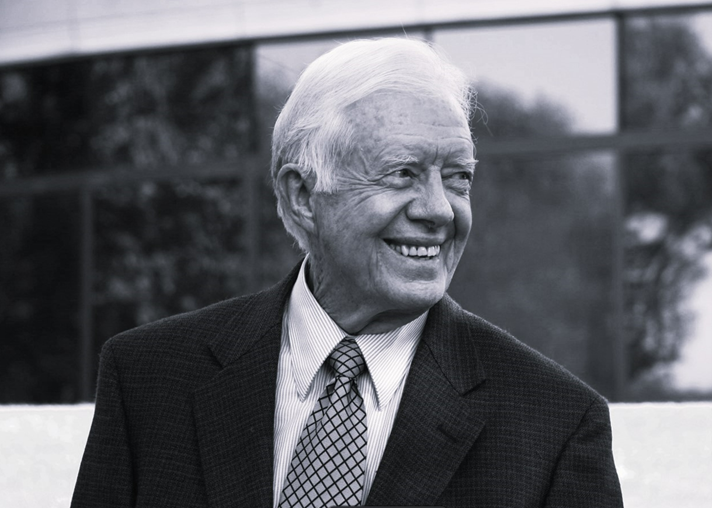Jimmy Carter: 1924-2024
To honor and support President Carter’s legacy of community work, The Coca‑Cola Foundation will contribute $250,000 to The Carter Center and $250,000 to Habitat for Humanity.

Jimmy Carter—a peanut farmer whose U.S. presidency sprung from the Georgia red clay—died December 29, 2024, at the age of 100. The longtime friend of The Coca‑Cola Company championed human rights well after his time in the White House and was awarded the Nobel Peace Prize in 2002 for his work to find peaceful solutions to international conflicts, advance democracy and promote economic and social development.
“President Carter was a tireless advocate for education, health, peace and justice for all,” said James Quincey, chairman and CEO of The Coca‑Cola Company. “His principles and legacy of values-driven leadership will continue to inspire here in Georgia and around the country and world.”
Born Oct. 1, 1924, in the small farming town of Plains, Ga., Carter attended Georgia Southwestern College and the Georgia Institute of Technology and received a B.S. degree from the United States Naval Academy in 1946. He became a submariner, serving in both the Atlantic and Pacific fleets, rising to the rank of lieutenant.
When his father, James Earl Carter, Sr., died in 1953, he resigned his naval commission and returned to Plains with his wife, Rosalynn, and family to take over the Carter peanut farms and operate a general-purpose seed and farm supply company. Carter became a leader in the community, serving on county boards supervising education, the hospital authority and library.
He entered politics in 1962 with his election to the Georgia Senate. Carter lost his first gubernatorial campaign four years later but won the next in 1970. A rising star among a contingent of new young Southern governors, he attracted attention by emphasizing ecology and government efficiency.
During his time as governor of Georgia, Carter developed a close relationship with The Coca‑Cola Company, notably President, Chairman and CEO J. Paul Austin.
In December 1974, Carter announced his candidacy for president of the United States and began a two-year campaign that gradually gained momentum.
When Carter defeated Gerald R. Ford to become the 39th president of the United States, he notably converted the White House back to Coca‑Cola (Presidents Nixon and Ford were Pepsi fans). Carter also appointed Charles Duncan, president of The Coca‑Cola Company from 1970-71, as Deputy Secretary of Defense and, later, Secretary of Energy.
There were other moments Carter and Coca‑Cola collaborated. For example, the company helped introduce the president and his cabinet to government officials in countries around the world where it had a strong presence.
After leaving the White House, in 1982, he became University Distinguished Professor at Emory University in Atlanta and founded The Carter Center with a mission to address national and international issues of public policy and to resolve conflict, promote democracy, protect human rights, and prevent disease and other afflictions.
The permanent facilities of The Carter Center, which include the National Archives-administered Jimmy Carter Presidential Library and Museum, were dedicated in Atlanta in 1986.
Until 2020, Jimmy and Rosalynn Carter volunteered one week a year for Habitat for Humanity, a nonprofit organization that helps needy people in the United States and other countries renovate and build homes for themselves. He also taught Sunday school in the Maranatha Baptist Church in Plains.
Coke’s ties to Carter continued after he left office. President, Chairman and CEO Roberto Goizueta chaired the steering committee to establish the Jimmy Carter Presidential Library in Atlanta in 1986. Goizueta said this about Carter in introducing him as the keynote speaker at the 1993 Coca‑Cola Scholars Foundation banquet:
“He not only led our country with faith and courage as president, but he has since become the embodiment of the difference a former president can make. He has brought health care to towns and villages in Africa. He has—with his unchallenged integrity—helped new democracies hold free and fair elections in Latin America. He has counseled the world’s warriors to settle their disputes by negotiation, not war.”